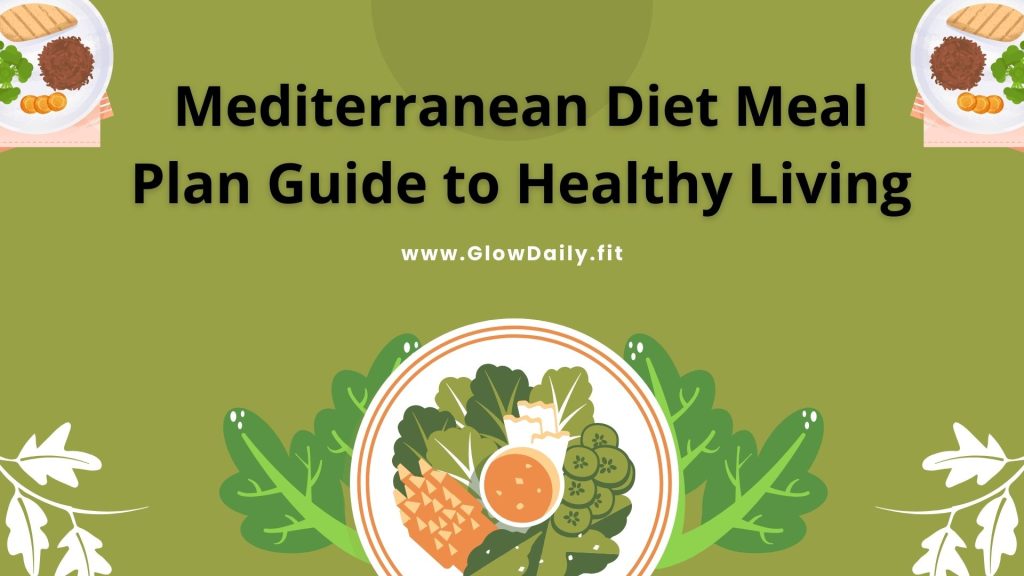The Ultimate 7-Day Mediterranean Diet Meal Plan: Guide to Healthy Living
Mediterranean Diet Meal has long been celebrated as one of the healthiest eating patterns in the world. Inspired by the traditional foods of countries bordering the Mediterranean Sea—such as Greece, Italy, and Spain—this diet is more than just a way of eating; it’s a lifestyle that emphasizes balance, simplicity, and enjoyment of food.
Ranked #1 Best Diet Overall by U.S. News & World Report for multiple consecutive years, the Mediterranean diet has earned global recognition for its ability to reduce the risk of chronic diseases, support healthy weight management, and promote longevity. It’s not about strict rules or deprivation—it’s about making healthier choices most of the time while still enjoying the pleasures of food, family, and community.
In this article, we’ll explore:
-
The history and philosophy behind the Mediterranean diet
-
The scientifically proven health benefits
-
A detailed 7-day meal plan (breakfast, lunch, dinner, snacks)
-
A Mediterranean shopping list
-
Lifestyle tips for long-term success
What Is the Mediterranean Diet Meal Plan?
Unlike many modern diets that promote cutting out food groups or following rigid calorie restrictions, the Mediterranean diet is a flexible and sustainable lifestyle plan. It focuses on whole, minimally processed foods such as:
-
Fresh fruits and vegetables
-
Whole grains like brown rice, quinoa, and farro
-
Legumes such as lentils, chickpeas, and beans
-
Lean proteins like fish, seafood, and poultry
-
Healthy fats from olive oil, nuts, and seeds
-
Limited dairy, mostly in the form of Greek yogurt or cheese
-
Red meat and sweets in small amounts
This approach mirrors the eating patterns of people in Mediterranean regions during the mid-20th century—a time when rates of heart disease, obesity, and chronic illness were remarkably low compared to the Western world.
Proven Health Benefits of the Mediterranean Diet
Decades of research confirm that following a Mediterranean-style eating pattern provides numerous health benefits:
-
Heart Health: Rich in omega-3 fatty acids, olive oil, and antioxidants, this diet reduces bad cholesterol (LDL) and supports cardiovascular wellness.
-
Weight Management: High fiber and protein keep you fuller for longer, reducing overeating without calorie counting.
-
Diabetes Prevention: Stable blood sugar from whole grains, legumes, and fiber lowers the risk of type 2 diabetes.
-
Longevity: Populations in Mediterranean “Blue Zones” have some of the world’s longest life expectancies.
-
Brain Health: Antioxidants, omega-3s, and anti-inflammatory foods protect against cognitive decline and dementia.
-
Sustainability: Plant-forward and environmentally friendly compared to heavy meat-based diets.
Al Roker High-Protein, High-Fiber Diet
7-Day Mediterranean Diet Meal Plan
Below is a practical 7-day plan you can use to get started. Each meal is nutrient-rich, flavorful, and easy to prepare.
Day 1
Breakfast: Greek yogurt with honey, walnuts, and fresh berries.
Why it works: Protein and probiotics from yogurt improve gut health, while walnuts add omega-3s.
Snack: A handful of almonds.
Lunch: Grilled salmon salad with arugula, cherry tomatoes, cucumbers, olives, and olive oil–lemon dressing.
Snack: Apple slices with almond butter.
Dinner: Baked chicken breast with roasted zucchini, eggplant, and quinoa.
Day 2
Breakfast: Overnight oats with chia seeds, almond milk, and figs.
Snack: Carrots and cucumbers with hummus.
Lunch: Whole-grain pita stuffed with falafel, lettuce, and tahini sauce.
Snack: A handful of pistachios.
Dinner: Grilled shrimp with garlic, lemon, brown rice, and sautéed spinach.
Day 3
Breakfast: Avocado toast on whole-grain bread with cherry tomatoes.
Snack: A cup of melon and grapes.
Lunch: Lentil and vegetable soup with whole-grain bread.
Snack: Dates stuffed with walnuts.
Dinner: Grilled sea bass with roasted sweet potatoes and broccoli.
Day 4
Breakfast: Vegetable omelet with spinach, mushrooms, and feta cheese.
Snack: A pear with cashews.
Lunch: Quinoa tabbouleh with parsley, tomatoes, chickpeas, and olive oil.
Snack: Greek yogurt with pumpkin seeds.
Dinner: Baked eggplant parmesan with a side salad.
Day 5
Breakfast: Smoothie with spinach, banana, blueberries, and oat milk.
Snack: Roasted chickpeas.
Lunch: Chicken gyro bowl with brown rice, cucumbers, and tzatziki.
Snack: Orange slices with dark chocolate.
Dinner: Baked cod with lemon, garlic, and roasted asparagus, served with farro.
Day 6
Breakfast: Toast with ricotta, strawberries, and honey.
Snack: A handful of mixed nuts.
Lunch: Mediterranean grain bowl with bulgur, roasted vegetables, and tahini dressing.
Snack: Cucumber slices with olive tapenade.
Dinner: Grilled lamb chops with roasted potatoes, carrots, and green beans.
Day 7
Breakfast: Greek yogurt parfait with granola, pomegranate seeds, and almonds.
Snack: Fresh figs with goat cheese.
Lunch: Tuna salad with olive oil, white beans, parsley, and lemon on whole-grain bread.
Snack: Sunflower seeds.
Dinner: Whole-wheat pasta with sautéed shrimp, cherry tomatoes, garlic, and spinach.
Mediterranean Diet Shopping List
To follow this plan, stock your kitchen with essentials:
-
Proteins: Salmon, tuna, shrimp, chicken, lamb, eggs, Greek yogurt.
-
Grains: Brown rice, quinoa, oats, bulgur, whole-wheat bread, pasta.
-
Vegetables: Spinach, broccoli, cucumbers, tomatoes, zucchini, eggplant, peppers.
-
Fruits: Berries, figs, oranges, apples, pears, bananas, grapes.
-
Legumes: Lentils, chickpeas, beans.
-
Nuts & Seeds: Almonds, walnuts, pistachios, sunflower seeds, pumpkin seeds.
-
Healthy Fats: Extra virgin olive oil, tahini, nut butters.
-
Herbs & Flavorings: Garlic, lemon, parsley, oregano, basil.
Lifestyle Habits Beyond Food
The Mediterranean diet is not only about what’s on your plate. It’s also about how you live:
-
Social Eating: Meals are often enjoyed with family and friends, reducing stress and improving satisfaction.
-
Regular Activity: Walking, biking, gardening, or swimming are common daily habits.
-
Mindful Eating: Slowing down and savoring food prevents overeating.
-
Moderation: Wine is consumed in small amounts with meals, not excessively.
Why This Diet Works Long-Term
Unlike restrictive diets that cut out carbs or demand strict calorie counting, the Mediterranean diet thrives on flexibility. It’s adaptable to different tastes, cultural traditions, and budgets. You don’t need special supplements or “superfoods”—just simple, whole ingredients prepared with care.
This makes it easier to follow for life, not just for a few weeks. And that’s why researchers consistently rank it as the healthiest diet in the world. Mediterranean Diet Meal Plan
Final Thoughts
The Mediterranean diet proves that healthy eating doesn’t have to be bland or restrictive. With its emphasis on fresh vegetables, lean proteins, whole grains, and heart-healthy fats, it delivers both flavor and function. Add in the cultural habits of movement, social connection, and moderation, and you have a blueprint for long-term health.
By following a plan like the 7-day meal plan above, you can enjoy delicious, satisfying meals while supporting your heart, brain, and overall well-being. Whether your goal is to lose weight, prevent chronic disease, or simply eat better, the Mediterranean lifestyle offers a path you can sustain for life.


